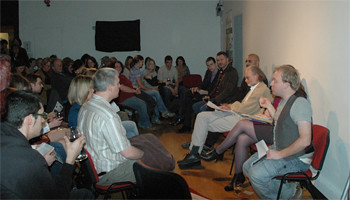The following is an essay written by Katie Lewis and relates to the sciSCREEN discussion after a screening of the film Her.
When you first heard the storyline for “Her”, you might have thought,
“A guy falling in love with his Operating System (OS) sounds quite weird. I had that teenage phase where I thought social interaction was too much effort and spent 12 hours a day playing World of Warcraft, but I don’t think I’d ever have taken it that far”. Hence, part of the success of this film rests on how believable or understandable the story is to us, the audience. Whether it works or not, this film highlights that meaningful connections with others are a fundamental human need, and it turns out that science has a lot to say about this.
If one day you thought, “cardiovascular disease, that sounds like fun” and you asked some people how you would go about getting it, after giving you a few weird looks, they would most likely recommend smoking 10 packs of cigarettes a day, going to McDonald’s for every meal and washing it all down with a bucket of whiskey (or something along those lines). This is also what health professionals thought. However, researchers were surprised to find that you can double (or even quadruple) your risk of chronic diseases simply by being socially isolated. Recent research even argues that its effects are on par to smoking and alcohol consumption. In addition to physical health, loneliness also has a negative impact on mental health. For example, being lonely increases the risk of depression, results in a poorer prognosis for those with dementia, and heightens risk of relapse for those with schizophrenia. The findings for physical illness are particularly intriguing because the medical profession traditionally held the view that psychological and physical issues were very separate things. So what accounts for this association? One argument was that lonely individuals are more likely to partake in unhealthy behaviours. In other words, if you’re lonely, you are more likely to eat KFC for 6 nights in a row plus there is no-one there to say, “why are you drinking Bailey’s from a shoe?” or “stop eating that black stuff on the George Foreman grill”.
However, research suggests that while social isolation can influence health behaviours, its effects on health persist even when controlling for a range of factors such as smoking, alcohol, diet and exercise. In particular, perceived social isolation (more commonly known as “loneliness”) seems to be more important in increasing this risk. This suggests that there are physical consequences of loneliness that are independent of our behaviours. In fact, lonely individuals have been found to have heightened levels of stress hormones and inflammatory markers in their blood, plus a range of other physical characteristics associated with the development of chronic diseases.
So why might humans have this detrimental response to loneliness? Most of us have heard someone describe the sensation of breaking up with a partner as “hurting”. However, research suggests that this statement is closer to the truth than it sounds. It turns out that the areas of the brain that are activated when we feel socially rejected overlap largely with those involved when we experience physical pain. Just like physical pain serves an adaptive purpose -- for example, “It hurts when I rub this cheese grater on my face, so I will stop doing that” -- so does social pain. Evolutionary psychologists propose that feeling pain in response to isolation bestowed an evolutionary advantage to our ancestors because it motivated them to seek connection to social groups. Groups promote survival through increased access to care, food and protection. They also act as an arena for meeting potential mates, and the protection of the group would mean that any resultant offspring would be more likely to survive and pass on their genes. Hence, over time a desire for social bonds became central to being human.
This need for connection can drive lonely individuals to seek substitutes in order to limit the negative consequences of social isolation. These substitutes can be animals, for instance, a lot of us may have suddenly found ourselves talking to our dog, even though we know they cannot communicate in the same way back. Some people might take this anthropomorphism a bit further and dress their pug in ‘revolting’ denim jackets. Studies even show that making people feel lonely will increase their likelihood of attributing human characteristics to inanimate objects such as gadgets. Hence, if people attribute human characteristics to things to combat loneliness, then it is understandable that Theo would attempt to combat any feelings of disconnectedness by forming a substitute connection to a very human-like OS. Thus, at face value, a guy falling in love with his OS might seem weird, but knowing what we know about human beings, it might not be that far fetched.
If one day you thought, “cardiovascular disease, that sounds like fun” and you asked some people how you would go about getting it, after giving you a few weird looks, they would most likely recommend smoking 10 packs of cigarettes a day, going to McDonald’s for every meal and washing it all down with a bucket of whiskey (or something along those lines). This is also what health professionals thought. However, researchers were surprised to find that you can double (or even quadruple) your risk of chronic diseases simply by being socially isolated. Recent research even argues that its effects are on par to smoking and alcohol consumption. In addition to physical health, loneliness also has a negative impact on mental health. For example, being lonely increases the risk of depression, results in a poorer prognosis for those with dementia, and heightens risk of relapse for those with schizophrenia. The findings for physical illness are particularly intriguing because the medical profession traditionally held the view that psychological and physical issues were very separate things. So what accounts for this association? One argument was that lonely individuals are more likely to partake in unhealthy behaviours. In other words, if you’re lonely, you are more likely to eat KFC for 6 nights in a row plus there is no-one there to say, “why are you drinking Bailey’s from a shoe?” or “stop eating that black stuff on the George Foreman grill”.
However, research suggests that while social isolation can influence health behaviours, its effects on health persist even when controlling for a range of factors such as smoking, alcohol, diet and exercise. In particular, perceived social isolation (more commonly known as “loneliness”) seems to be more important in increasing this risk. This suggests that there are physical consequences of loneliness that are independent of our behaviours. In fact, lonely individuals have been found to have heightened levels of stress hormones and inflammatory markers in their blood, plus a range of other physical characteristics associated with the development of chronic diseases.
So why might humans have this detrimental response to loneliness? Most of us have heard someone describe the sensation of breaking up with a partner as “hurting”. However, research suggests that this statement is closer to the truth than it sounds. It turns out that the areas of the brain that are activated when we feel socially rejected overlap largely with those involved when we experience physical pain. Just like physical pain serves an adaptive purpose -- for example, “It hurts when I rub this cheese grater on my face, so I will stop doing that” -- so does social pain. Evolutionary psychologists propose that feeling pain in response to isolation bestowed an evolutionary advantage to our ancestors because it motivated them to seek connection to social groups. Groups promote survival through increased access to care, food and protection. They also act as an arena for meeting potential mates, and the protection of the group would mean that any resultant offspring would be more likely to survive and pass on their genes. Hence, over time a desire for social bonds became central to being human.
This need for connection can drive lonely individuals to seek substitutes in order to limit the negative consequences of social isolation. These substitutes can be animals, for instance, a lot of us may have suddenly found ourselves talking to our dog, even though we know they cannot communicate in the same way back. Some people might take this anthropomorphism a bit further and dress their pug in ‘revolting’ denim jackets. Studies even show that making people feel lonely will increase their likelihood of attributing human characteristics to inanimate objects such as gadgets. Hence, if people attribute human characteristics to things to combat loneliness, then it is understandable that Theo would attempt to combat any feelings of disconnectedness by forming a substitute connection to a very human-like OS. Thus, at face value, a guy falling in love with his OS might seem weird, but knowing what we know about human beings, it might not be that far fetched.







No comments:
Post a Comment